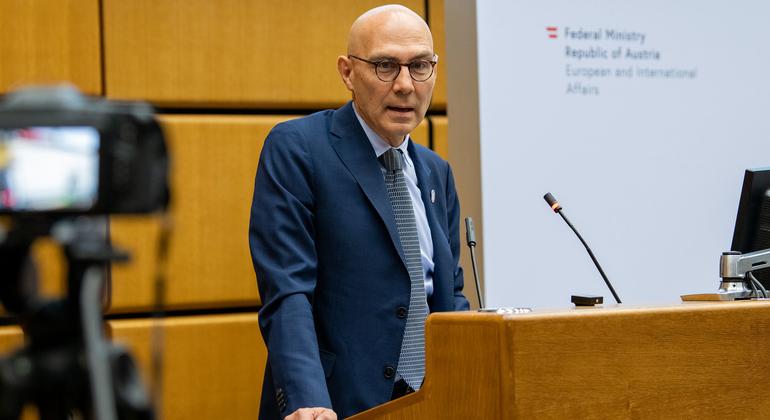The United Nations Human Rights High Commissioner, Volker Türk, expressed shock and dismay at the recent comments made by Israeli finance minister Bezalel Smotrich, who suggested that allowing two million Palestinians in Gaza to starve to death could be considered “justified and moral” in order to free hostages. The Office of the High Commissioner for Human Rights (OHCHR) spokesperson, Jeremy Laurence, conveyed the High Commissioner’s condemnation of these remarks in the strongest terms, noting that they not only endorse the starvation of civilians as a method of warfare but also constitute a form of collective punishment against the Palestinian population, both of which are considered war crimes.
Mr. Laurence emphasized the dangerous implications of such inflammatory statements, stating that they have the potential to incite further atrocity crimes. He called for an immediate cessation of such rhetoric, particularly from public officials, and stressed the importance of investigating any statements that could amount to criminal behavior. If found to be in violation of international law, those responsible must be prosecuted and held accountable for their actions.
Furthermore, Mr. Laurence reiterated OHCHR’s longstanding appeal for an immediate ceasefire in Gaza, the release of all hostages, and increased humanitarian aid to be provided to the enclave. He underscored the responsibility of the Israeli authorities to monitor and address such behavior, emphasizing the need for swift action to prevent further escalation of the situation.
Meanwhile, the impact of the recent evacuation order in Gaza was already becoming apparent, as thousands of Palestinians were forced to flee their homes in eastern and central Khan Younis and the Al Salqa area of Deir Al-Balah. Louise Wateridge, a senior communications officer with the UN Relief and Works Agency for Palestine Refugees in the Near East (UNRWA), described the scenes of families fleeing their homes in dire conditions, carrying whatever belongings they could as they sought safety.
Ms. Wateridge recounted the harrowing scenes she witnessed in Khan Younis, where families were seen trekking westward in sweltering temperatures, highlighting the urgency of the situation and the need for immediate assistance. She described it as an “exodus” of people who had been displaced once again, facing uncertainty and hardship as they sought refuge from the ongoing conflict.
In light of the recent discovery of polio in sewage samples in Gaza, plans were underway to vaccinate over half a million children in the region. UNRWA, in collaboration with UNICEF and the Gaza Ministry of Health, was preparing to launch two rounds of inoculations to prevent the spread of the disease. Ms. Wateridge emphasized the importance of a ceasefire to facilitate the vaccination campaign, highlighting the challenges posed by ongoing hostilities and the need for a conducive environment for humanitarian efforts to succeed.
She reiterated UNRWA’s commitment to leading the vaccination campaigns on the ground, citing the agency’s extensive presence in the Gaza Strip and its role in delivering essential services to the population. Despite the obstacles posed by the conflict, UNRWA remained dedicated to ensuring the health and well-being of Palestinian children, underscoring the importance of international support and cooperation in addressing the urgent needs of the population in Gaza.
As the situation in Gaza continued to deteriorate, with escalating violence and humanitarian crises unfolding, the call for immediate action and intervention grew louder. The plight of the Palestinian people, trapped in a cycle of conflict and suffering, underscored the urgent need for a sustainable peace agreement and a lasting resolution to the conflict. The international community’s commitment to upholding human rights and protecting civilians in times of crisis was more crucial than ever, as innocent lives hung in the balance amidst the chaos and destruction.









